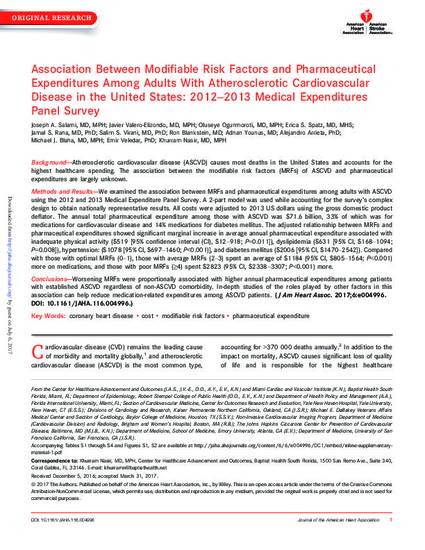
BACKGROUND:
Atherosclerotic cardiovascular disease (ASCVD) causes most deaths in the United States and accounts for the highest healthcare spending. The association between the modifiable risk factors (MRFs) of ASCVD and pharmaceutical expenditures are largely unknown. METHODS AND RESULTS:
We examined the association between MRFs and pharmaceutical expenditures among adults with ASCVD using the 2012 and 2013 Medical Expenditure Panel Survey. A 2-part model was used while accounting for the survey's complex design to obtain nationally representative results. All costs were adjusted to 2013 US dollars using the gross domestic product deflator. The annual total pharmaceutical expenditure among those with ASCVD was $71.6 billion, 33% of which was for medications for cardiovascular disease and 14% medications for diabetes mellitus. The adjusted relationship between MRFs and pharmaceutical expenditures showed significant marginal increase in average annual pharmaceutical expenditure associated with inadequate physical activity ($519 [95% confidence interval (CI), $12-918; P=0.011]), dyslipidemia ($631 [95% CI, $168-1094; P=0.008]), hypertension: ($1078 [95% CI, $697-1460; P<0.001)], and diabetes mellitus ($2006 [95% CI, $1470-2542]). Compared with those with optimal MRFs (0-1), those with average MRFs (2-3) spent an average of $1184 (95% CI, $805-1564; P<0.001) more on medications, and those with poor MRFs (≥4) spent $2823 (95% CI, $2338-3307; P<0.001) more. CONCLUSIONS:
Worsening MRFs were proportionally associated with higher annual pharmaceutical expenditures among patients with established ASCVD regardless of non-ASCVD comorbidity. In-depth studies of the roles played by other factors in this association can help reduce medication-related expenditures among ASCVD patients.
J Am Heart Assoc (2017) 6(6) pii: e004996

© 2017 The Authors. Published on behalf of the American Heart Association, Inc., by Wiley. This is an open access article under the terms of the Creative Commons Attribution-NonCommercial License, which permits use, distribution and reproduction in any medium, provided the original work is properly cited and is not used for commercial purposes.